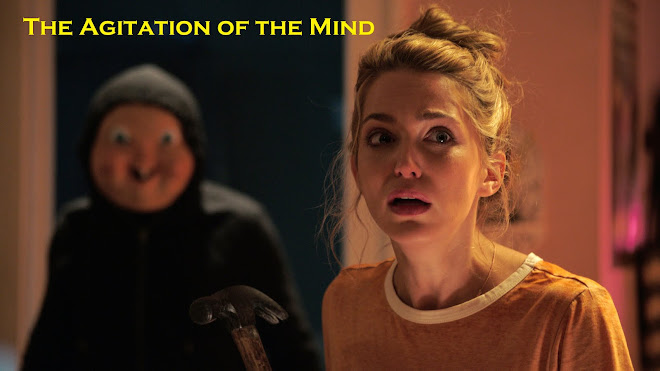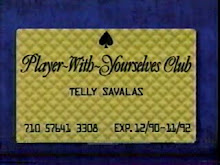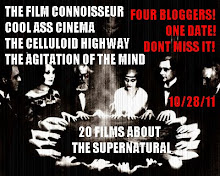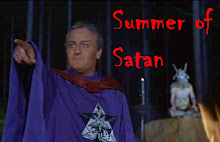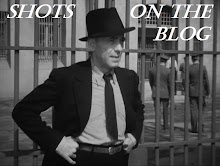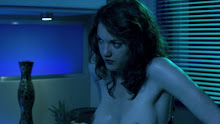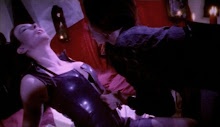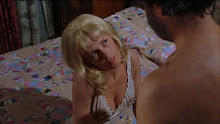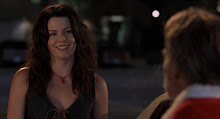Wednesday, July 30, 2014
My Summer of Love
I haven’t read the novel by Helen Cross that it’s based on, but I recall a press quote that featured prominently on the cover when Pawel Pawlikowski’s film adaptation herded it back onto the bookshelves: “a hand grenade of a novel”.
Pawlikowski’s film is more like an unexploded incendiary device buried deep in the Yorkshire countryside. Or like two volatile chemicals sloshing towards each other across the quiet streets of a small town. One of these chemicals is called Mona (Natalie Press), the other Tamsin (Emily Blunt).
Let’s pause for a second to shoot the elephant in the room. Yes, this was the film that launched Emily Blunt towards her Hollywood career. Yes, I’m a huge fan of Emily Blunt. No, I can’t account for why the fuck Blunt got the stellar career instead of Press. And I certainly can’t account for why Blunt’s choices and performances since ‘My Summer of Love’ have invariably tiptoed on the side of what’s safe and anodyne when she’s so gloriously and effervescently full of promise here.
Although, in retrospect, Blunt gets the easier role: sure, it’s more showy, but her portrayal of Tamsin requires less in the way of audience engagement. Throughout, she’s either a foil to Mona, or she spurs Mona on. Either way, it’s Natalie Press who carries the film and contains all of its emotionalism and she’s quite simply magnificent.
Mona is an almost archetypal working class girl, unemployed and living above the pub her brother, Phil (Paddy Consodine), once ran but has now turned into a Bible studies centre. Her affair with a married man has run its course, the flabby oik in question unwilling to walk out on his wife. She spends her days coasting along the high roads above her village on a motorbike that doesn’t have an engine.
It’s a life that has stultified – her sense of dislocation is exacerbated by the sense that she’s lost Phil, the volatile but full-of-life sibling she used to idolise, to born-again Christianity – but a single random encounter with the elegant, enigmatic and oh-so-fashionably bored Tamsin is all it takes to up-end the apple cart of her existence and explode her horizons beyond anything she thought possible.
Although self-evidently different in terms of class, intellectualism and general outlooks on life, Mona and Tamsin strike an immediate bond. Similarities appear: Tamsin opines the loss of a sister, Mona feels her brother has become a different, alien, person. Mona reacts to Tamsin’s father’s marital infidelity by vandalising the lovingly polished Jaguar that’s evidently his pride and joy, while Tamsin leads the charge in taking revenge on Mona’s ex-lover. Tamsin doesn’t look down on Mona’s vernacular speech and hardscrabble life; Mona doesn’t rail from Tamsin’s love of the classical music and erudite literature. The first half of the life is a sugar rush of visual and narrative enjoyment as an unconventional friendship gradually shades towards romance.
But a darker edge is always just on the periphery of things. Tamsin’s relentless fixation on tragedy sounds a warning bell. Phil’s veneer of love and godliness strains under reminders of the brawling bad boy he used to be – the one, let’s not forget, who Mona would prefer to have back. Meanwhile, Mona herself careens through the film, a deliriously excited woman-child one moment, a fizzing concoction of rebellious self-assertion the next. Throw into the mix Tamsin’s almost malevolent urge to expose Phil as a hypocrite and anything could happen.
Pawlikowski’s direction intuitively keys in to his characters’ psychology. The film has hazy, slightly wonky look about it that is both visually beautiful and disorientating. Rural Yorkshire looks more like a fever dream or a fantastist’s mindscape than the “grim oop north” backdrop that most British films would make of it. A ballroom dancing scene where sedately waltzing couples in the twilight of their years are interrupted and rendered aghast by Mona and Tamsin’s same-sex tango across the dance floor and up to the pathetically small stage which they then attempt to invade is a perfect example of Pawlikowski deconstructing social realism in the service of an impressionistic immersion in the all-too-brief emotional sugar rush that his heroines are experiencing.
Other scenes, though, could have come straight from the cinema of Loach or Meadows, not least in the denuded interior of the pub Phil runs into the ground in order to recreate as the unlikeliest temple in British cinema. Our first glimpse of Phil has him pouring away the contents of various bottles of spirits. Mona’s immediate reaction is to liberate a bottle of beer and question his sanity. One can empathise.
Tamsin instantly intuits that Phil is inhabiting a false persona – not wishing to give anything away, but the old saw of “it takes one to know one” applies – and takes it upon herself to reveal him as a fraud and a hypocrite. Of course, the likes of Phil will always lash out at life, Bible study or Bible study, and Consodine’s slow-burn performance gradually peels away the surface until the Phil of old is revealed. But, damn, Consodine’s a good actor when he’s got the right director to reign him in and keep him focused. His turn in ‘My Summer of Love’ shows up much of his CV as a retinue of easy/lazy choices.
The respective Mona-Phil and Phil-Tamsin payoffs make for electric viewing, but it’s the revelations about Tamsin that supercharge the drama of the final act, and Press comes into her own as the sweeping love to which Mona’s committed herself heart and soul breaks apart like a flooded dam. The film might be called ‘My Summer of Love’, but suggestion of an autumn of something else entirely gives the part-fiery/part-melancholy denouement its distilled power.
Labels:
Emily Blunt,
Natalie Press,
Paddy Considine,
Pawel Pawlikowski
Thursday, July 24, 2014
Weekend
And if that’s the only bad thing I’ve got to say about ‘Weekend’, then it’s safe to conclude that we’re in high quality indie territory and settle back to discuss a big-hearted but unsentimental relationships drama. Though perhaps it’s worth mentioning that if you don’t live in the city, there’s nothing to tip you off that ‘Weekend’ is a Nottingham film. There are no shots of the castle, the Robin Hood statue, the Forest ground, Trent Bridge or its adjacent cricket ground. There are no specifically local references in the dialogue. Even the names of the tram stops – David Lane, Phoenix Park – are generic and could crop up in any city.
Russell is quickly established as not so much closeted but preferring the social equilibrium of a “don’t ask don’t tell” approach to his sexuality. Taking his leave of the hetero bunch as Friday wanes, Russell heads into the city centre and finds a gay bar (Propaganda, in case you were wondering). He wakes up with Glen (Chris New) and the nuances, uncertainties and sweeping passions of the early stages of any new relationship are distilled into a short time frame that proves – for both of them – exhilarating, frustrating and bittersweet in roughly equal measures.
Unlike, say, Linklater’s ‘Before…’ trilogy, where the couple swan around various European cities as if their short time together were as endless as the films seem to be, the stakes in ‘Weekend’ seem immeasurably higher, the moment of separation hurtling towards both of them and so much yet to discover, so much remaining unsaid. Indeed, whereas Linklater’s moony pair are never short of verbiage, Haigh’s characters more often than not experience communication breakdowns, particularly in a single-take argument late in the film that runs for several minutes, during which both of them attempt to break through to each other only to inevitably reach for the wrong words and batter away at the brick wall of opposing opinions rather than trying for the neutral ground of compromise. Which is exactly how any passionate couple will behave: it’s the passion that blinds them.
‘Weekend’ throws itself against the horrible overwhelming totality of that question and finds, if not an answer, then at least a compelling justification for living for the moment.
Sunday, July 20, 2014
Shifty
Low-budget drama ‘Shifty’ covers 24 hours in the life of a London-based drug pusher as family pressures, the reappearance of a friend from the past, the attentions of an off-the-handle client and the escalating threat of violence close in on him; and, as such, sounds exactly like the kind of Brit-grim urban crime genre that’s been done to death since Guy Ritchie staked his claim to the territory with ‘Lock, Stock and Two Smoking Barrels’ sixteen years ago.
But Eran Creevy’s assured debut is so much more than just dodgy geezers, dubious deals and eff-word-heavy dialogue (although, in the interests of accuracy, all three of these ingredients are present and correct). What it’s actually about is family, friendship, responsibility, regret, paths not taken, possibilities that remain, and the gossamer-like hope of redemption … or at the very least a new start. These are big themes for an 85-minute genre movie shot on a meagre £100,000 budget (kudos to Ed Wild’s cinematography and Erik Rehl’s production design for making it look like they spent ten times that much on it) and ‘Shifty’ could easily have been a sombre, plodding, po-faced piece of work. Creevy’s droll screenplay and confident directorial style, however, dispel all potential pitfalls, and what emerges is a very well nuanced, wryly observed and often very funny slice-of-life.
Shifty (Riz Ahmed) is the titular pusher, living with his devout Muslim brother Rez (Nitin Ganatra) after a falling-out with his parents. He’s well-educated (four A-levels), well-spoken and has the nous to conduct business within a specifically defined area and not upset the apple cart vis-à-vis his necessary relationship with Glen (Jason Flemyng), a player who operates in a higher tier of the criminal fraternity. Not that relationships between the major players are that fraternal, as Shifty discovers when he’s mugged and relieved of a significant chunk of Glen’s merchandise.
Self-employed building contractor Trevor (Jay Simpson) is Shifty’s least-favourite client – his favourite is crazy cat lady Valerie (Francesca Annis: terrific in a brief cast-against-type scene) – not least because he’s already run up a debt with Shifty while still badgering him for more crack. Trevor’s life is unwinding rapidly: he’s fired from a job for bringing drugs onto a building site, and his relationship with his wife Jasmine (Dannielle Brent) is reaching breaking point. Trevor sets himself on a trajectory that will ultimately be destructive for Shifty.
Into this increasingly pressurized environment comes Chris (Daniel Mays), Shifty’s best mate from back in the day who fled to Manchester years ago after a drug-related death he was implicated in. Chris’s return alerts Rez to his brother’s current activities, culminating in a confrontation that is low-key but effectively intense. Ahmed and Ganatra do excellent work here; both have real screen presence, with Ahmed vibing old-school movie star cool, and Ganatra possessed of a gravitas that allows for an appealingly minimalist acting style. Why both of them aren’t headlining major studio productions right now is a mystery.
In addition to great performances and quirky humour – “I can’t believe you’ve just sold crack to Miss Marple and struck a deal with Blazin’ Squad,” Chris remarks after their visit to Valerie ends with the unexpected cultivation of her wannabe urban rebel neighbour as a buyer – ‘Shifty’ benefits from Creevy’s decision to portray the kind of sinkhole estate familiar from everything from Ken Loach’s ‘Ladybird Ladybird’ to Andrea Arnold’s ‘Fish Tank’ not as a place of abject poverty and squalor but as home to a vibrant and unique set of characters. Yes, there’s graffiti and claustrophobic underpasses, but there are also parks and greenery and a sense that the characters are comfortable with their environment rather than being oppressed by it. Almost as an extension of this aesthetic, Creevy keeps the violence minimal and doesn’t fetishize it.
Regarding the violence, I don’t want to give away too much about the finale in which Shifty and Chris wait out what would be a long dark night of the soul if they didn’t spend so much of it making each other laugh. Suffice it to say they’re expecting a visit from some heavy types, an encounter Shifty could easily have avoided simply by leaving town (Chris repeatedly implores him to decamp to Manchester) but doesn’t on account of the trouble it would bring down on his brother. Suffice it to say that ‘Shifty’ makes a sudden but beautifully subtle transition from urban crime flick to moralistic western, a pusher and his loser mate unexpectedly recast as heroic sheriff and slightly shambolic deputy awaiting the superior numbers of their antagonists. It’s at this point that the film really becomes something special, claiming more kinship with ‘High Noon’ or ‘Rio Bravo’ than ‘RocknRolla’ or ‘Essex Boys’. And Creevy still has one more neatly executed switcheroo up his sleeve.
It was five years between ‘Shifty’ and Creevy’s next project, ‘Welcome to the Punch’, which underperformed at the box office. Here’s hoping his next project, the chase thriller ‘Autobahn’ starring Nicholas Hoult, Anthony Hopkins and Ben Kingsley, finally gives him the breakout success he deserves.
Tuesday, July 15, 2014
12 Years a Slave
Full disclosure: I avoided this one on the big screen. Everything about the trailers and posters screamed “worthy but dull Oscar bait”. Finally approaching it in the context of Steve McQueen’s previous films, I’m still slightly of that opinion but it needs to be said: overall, ‘12 Years a Slave’ is one hell of a piece of filmmaking.
Based on the memoir by Solomon Northup, a freeborn black man who was Shanghai-ed and sold into slavery in 1841 – even his name was taken away: his slave name was “Platt” – ‘12 Years a Slave’ is in some respects a handsomely mounted epic (it’s the most Hollywood looking of McQueen’s films), and in others as much of an endurance test as anything crafted by Michael Haneke or Lars von Trier. Whereas, however, Haneke and von Trier (for me anyway) never quite avoid the sense that they’re staging unpalatable scenes for the sake of it, McQueen depicts every act of inhumanity – and there are many – with a profound and highly moral sense of purpose.
There’s a scholarly piece to be written on ’12 Years a Slave’ as a response to ‘Django Unchained’ – it’s draining where Tarantino’s film is cathartic; subdued where Tarantino is explosive; graphically horrible in its violence where Tarantino’s is over-the-top and soaked in pop culture aesthetic – and this is nowhere more evident in McQueen’s commitment to anti-narrative as opposed to the adherence of ‘Django Unchained’ to a cohesive story arc. At its most reductive, a synopsis of ‘12 Years a Slave’ would run like this: Solomon Northup (Chiwetel Ejiofor) is kidnapped and sold into slavery, first to Ford (Benedict Cumberbatch) then to the sadistic Epps (Michael Fassbender) under whose ownership his sufferings worsen. Eventually, via the intervention of abolitionist Bass (Brad Pitt), he is able to prove his freeborn status and return to his old life.
There are very few scenes that function around a narrative or dramatic dynamic – for the most part the film unfolds as Solomon suffers act of brutality then Solomon witnesses act of brutality then plantation owner acts despicably then overseer acts despicably, one after another building to cumulatively shattering depiction of what it is to lose one’s liberty, one’s family and even one’s name. The auction at which Solomon is sold to Ford is a case in point: ironically-named slave dealer Freeman (Paul Giamatti) lines up his wares, male and female, stark naked like sculptures in some bizarre art gallery of dark commerce. Narratively, it fulfils the simple purpose of transiting Solomon to Ford’s plantation. The scene itself, though, has an almost surreal quality; the gleaming skin of Freeman’s slaves and the slick dialogue he employs opens a contemporary point of reference: the oleaginous salesman steering the customer towards the most expensive model in the showroom.
Likewise most of the scenes of violence – be it beating or whipping – are not prefigured or built up to by the tempo and suspense of a scene: they simply erupt and then subside again, part of the fabric of the film; part of the daily life, McQueen acknowledges sadly, of the enslaved. The contrast of Ford and Epps gives the film its only hint of a structure: Act One – Solomon retains his dignity under a conservative owner; Act Two – Solomon undergoes almost total depersonalisation under a total bastard.
Deeming Ford “conservative” is relative concept. Superficially, he’s not monstrous and he responds well to Solomon’s transportation suggestions around his logging operation. However, he still fucking owns slaves and no matter how many readings he gives from the Bible and how light he is on the whip, there’s no getting away from this one simple fact. Moreover, he has no qualms at employing the loathsome Tibeats (Paul Dano) as overseer. Tibeats delights in setting teams of slaves to work while serenading them with the tactless ditty “Run, nigger, run” as a warning against escape attempts.
The inevitable conflict between Solomon and Tibeats sets the scene for one of the film’s most horrific yet mesmerising scenes. Beaten and hoisted from a tree, Solomon is compelled to stand on tip-toe, maintaining his balance, the slightest movement tightening the noose around his neck. In a long-shot that McQueen holds for a minute and a half – nothing compared to the 17-minute dialogue scene in ‘Hunger’, but excruciating and seemingly interminable while you’re watching it – as other characters weave in and out of frame behind Solomon, going about their daily business as if oblivious. It’s a scene about the banality of evil and the everyday complicities (in the interests of survival) of the oppressed.
It’s this incident that prompts Ford to sell Solomon to Epps, with the twofold result of forestalling any future problems with Tibeats and the discharging of a debt to Epps. There’s an immediate juxtaposition between the two plantation owners. Like Ford, Epps is introduced reading the Bible, but unlike Ford’s liberalism and gently improving teachings, Epps uses the good book to make a point about property and a man’s right to dispose of said in any way that pleases him. And it pleases Epps to whip, beat and rape his property. If Ford is a slave owner because he’s a businessman, Epps treats his slaves as pawns in an elaborate game of chess reimagined as hate-fucking with his wife (Sarah Poulson) as his opponent of choice. Epps has a particular fixation on Patsey (Lupita Nyong’o); Mrs Epps, predictably, hates her. The poor girl suffers at both of their hands.
This second half of the film is the most gruelling. Fassbender and Poulson conjure a vision of utter corruption on every level. Alongside Ejiofor and Nyong’o they give the best performances on offer here (though kudos to Giamatti: although his role is small, he shrugs off the mugging that has afflicted much of his recent work and re-engages with acting). McQueen defines degenerative influence of Epps so effectively that a scene where Epps manoeuvres Solomon into burning a letter that might set him from is as toe-curlingly unwatchable as an extended whipping, blood flecking from each blow.
It’s curious, then, given Epps’s sadistic streak and knowledge of Solomon’s earlier attempt to draw attention to his plight, that he sets Solomon to work with the outspoken Bass. The moment Bass delivers his big “white man’s guilt” speech – Pitt’s performance is the film’s weak spot – it’s inexplicable that Epps doesn’t drag Solomon away from him and set him back to work picking cotton. And there are a few other moments that don’t quite add up: the logistics, intricacies and expense of luring Solomon away from his family in the opening scenes seem economically at odds with what he’s sold for; Solomon pens his first, failed, letter in the grounds of Epps’s plantation, a candle guttering, a fire flickering away under a pot of home-made ink, without a single overseer getting suspicious and coming to investigate; Solomon returns after 12 years to the same well-appointed townhouse that his family have inexplicably managed to keep retain.
These are minor things, but there are enough of them to keep the film from greatness. The non-ageing of Solomon until the final scene is also curious, and doesn’t help the film’s tendency to unfurl from one incident to the next without establishing just how far into his 12-year indenture Solomon is at any given point. That Solomon is clean-shaven, neatly-coiffured and dressed in unsoiled clothes in every scene is, I assume, an aesthetic decision on McQueen’s part to accentuate the dignity and humanity that Solomon clings onto throughout his ordeal, but again a slightly false note is struck.
In comparison to ‘Hunger’ – still McQueen’s best film – and ‘Shame’, the director’s trademarks are present but muted, perhaps in accordance with the requirements of working with a larger cast and bigger budget (although, at $18million, said budget was loose change by Hollywood standards). Static takes are longer than usual for mainstream filmmaking, but there’s nothing that remotely equals the 17-minute Sands/Moran scene in ‘Hunger’ or the 10-minute restaurant scene in ‘Shame’. There’s one shot of the protagonist running, but it’s over in seconds and doesn’t carry the backstory of the young Bobby Sands in ‘Hunger’ or the immediacy of Brandon’s disruption from his carefully ordered life in ‘Shame’. There is none of the bleak palette that characterises the cinematography of either of these two films.
What there is, however, and what indelibly stamps ’12 Years a Slave’ with Steve McQueen’s authorial signature, is its intensely rigorous and purposeful examination of depersonalisation. As the prisoners in ‘Hunger’ are stripped and mistreated and broken down by a system hellbent on destroying them for political reasons, and as Brandon in ‘Shame’ ravages his body in increasingly frenzied and desperate and purposeless liaisons in order to repress any shred of emotion, so Solomon is variously forced to co-operate, endure, turn a blind eye or turn his back (his deliverance from Epps’s plantation while Patsey and the others needs must remain is terrible to watch); to do, in other words, what is necessary to survive. Even if he survives as a non-person, saddled with a name that isn’t his.
Sunday, July 13, 2014
Shame
Picture the scene: an average Sunday morning at Agitation Towers, yours truly drinking coffee, eating toast, watching ‘Shame’ on DVD and becoming more intimately acquainted with Michael Fassbender than I’d anticipated. Five minutes in and the guy’s walking bare-ass naked around his aesthetically severe apartment. And not just bare-ass, either. There ought to be a separate screen credit for Fassbender Junior.
‘Shame’ continues the cinema of body politic that ‘Hunger’ utilized. But here the focus is on internalization rather than institutionalization. Fassbender plays Brandon, an Irish-born New Yorker with a successful job (what he does is never really defined), a spacious apartment, an extensive vinyl collection (the first LP we hear him play is Bach’s Goldberg Variations) and a major addiction to sex that he sort-of controls by paying for hookers and watching online porn. At the office, his PC is carted off by the IT bods due to a virus, a subplot that plays out as predictably as you’d imagine (Brandon gets hauled in by his boss over the hard-drive content) only to peter out (there’s some vague suggestion that Brandon’s intern is left to shoulder the blame, not that we’re ever introduced to Brandon’s intern).
Brandon’s overtly buttoned-down lifestyle is disrupted when his needy, flaky and hectoring sister Sissy (Carey Mulligan) decamps to his apartment following a relationship meltdown. Sissy is a fucking annoying character, both for the way she’s written and Mulligan’s histrionic performance. I’ll admit to having found Mulligan curiously overrated ever since ‘An Education’, and the understated yet deeply committed performance that Fassbender gives here only shows up Mulligan’s weaknesses. Plus, her rendition of ‘New York, New York’ is so painful that it probably contravenes the Geneva Convention. What Sissy’s presence does – in terms of the very slender narrative (‘Shame’ is essentially a series of analytically staged vignettes, loosely strung together) – is dynamite Brandon out of the safety of his apartment, the four walls of which have thus far provided containment for his extracurricular activities.
No longer able to entertain hookers and dictate the mood and the staging of the encounter (“do it slowly”), he is forced to trawl bars and clubs. His emotionless façade erupts in anger coated with self-loathing when Sissy laughingly catches him masturbating. He black-bags his porn stash and laptop and leaves them for the garbage men. Even the orderliness of the apartment itself is violated: she blares disco music instead of his carefully tasteful vinyl; strews her possessions everywhere; provides a constant stream of verbiage that denies him quietness and solitude. Ultimately, she brings Brandon’s douchebag boss David (James Badge Dale) back to the apartment and “entertains” him.
It’s during this less than amenable period of flat-sharing that Brandon finds himself drawn to a colleague, Marianne (Nicole Beharie). Their awkward first date, in an upmarket restaurant, the waiter from hell flitting around them incessantly, is analogous to the 17-minute dialogue-across-the-table scene in ‘Hunger’, and is similarly placed in the film – almost exactly to the minute. But whereas ‘Hunger’ used its epic single-take dialogue scene to reveal Bobby Sands, the restaurant scene in ‘Shame’ is an exercise in watching Brandon conceal. It’s not until after they’ve left the eaterie that anything remotely answering to the description of natural conversation happens between them. Even then, Marianne is unsure about seeing him again. However, Brandon persuades her to a hotel the next day (on the firm’s time!) and things come to an abrupt and humiliating halt when he’s unable to perform.
Thus it is that the film earns its title. Embarrassed at his sister’s glimpse into his sexual obsessions and unable to connect with her emotionally; ashamed at his failing with Marianne; and disgusted at the despoiling of the sanctuary of his apartment by Sissy and David’s dalliance, he becomes reliant on self-debasement and increasingly depersonalised encounters into to achieve gratification. The last twenty minutes or so document a descent into complete emotional negation – he unspools explicit chat-up lines to a woman in a bar, earning himself a beating from her partner; he follows a rent boy into a gay club; he engages in the angriest and least erotic threesome in the history of cinema – until the resolution of Sissy’s own instabilities jolts him back into something like the real world.
At its best, ‘Shame’ rigorously and intelligently debates sexual dysfunctionalism and tries to define where the tipping point is when emotion is so persistently suppressed in favour of the purely physical. McQueen’s minimalist script, co-written with Abi Morgan, sometimes helps this debate by paring away peripheral details: Brandon’s job is a good example, in that for the film to work, we don’t really need to know what he does beyond the fact that he earns enough to rent a swish apartment and pay high-class hookers in cash, and therefore his office is generic, his work based conversations are generic, and whether he works in advertising, PR, HR, information, data analysis or graphic design I don’t know and don’t care. And I love the fact that the film recognises this non-requirement.
At the same time, though, the characters of David (who sleeps with Sissy despite being married and is therefore contrasted with Brandon in that both essentially pursue sexual encounters outside the relationship-based social norm) and Marianne (who represents said social norm) are integral to Brandon’s job, and the lack of consequences in Brandon’s PC being clogged with porn, not to mention Brandon and Marianne’s sneaking off to a hotel for nookie in the middle of a working day, also without consequence, strike small but niggling false notes. Likewise, the culmination of Sissy’s behavioural pattern lurches the film into melodrama, particularly a late-in-the-day suggestion of some kind of intuitive bond between them. Worst is McQueen’s depiction of the gay club, as breathlessly prurient and unabashedly clichéd as anything since Friedkin’s ‘Cruising’.
Where ‘Shame’ really delivers, though, is in Fassbender’s performance. He’s beyond good, and the level of trust that must operate between him and McQueen can only be guessed (and marvelled) at! This is raw, physical acting; as demanding and – in every sense of the word – naked as anything in ‘Hunger’. Though the two films are intensely different, McQueen’s aesthetic provides correlation: the extended, dialogue-heavy single takes; scenes of his protagonists running; detailed attention to the rhythms and repetitions of his characters’ lives; a steely palette that mirrors the dehumanisation of prison in ‘Hunger’ and Brandon’s prison-of-the-self in ‘Shame’. And Michael Fassbender in career-defining roles. On the basis of these two films alone, McQueen/Fassbender rank equal to Scorsese/de Niro in the pantheon of director/actor partnerships.
Thursday, July 10, 2014
Hunger
I was nine when Bobby Sands led the controversial hunger strikes in The Maze prison, Northern Ireland, and I remember the news coverage even if I was too young – and, let’s face it, too fucking English – to understand the wider concept. Not that the news reports I saw would have given me that: then, as now, the BBC covered the news the government told it to, with the bias the government determined.
‘Hunger’, the debut feature film by Turner Prize-winning visual artist Steve McQueen, burns with a righteous anger at the British government’s intervention in Ireland and its treatment of political prisoners. McQueen’s attention to detail, and his ability to communicate the rhythms, rituals and repetitions of prison life, is the basis for a steady and unflinching accretion of sound, image and an almost tactile immersion of his audience in the milieu depicted. The overall effect is shattering; draining. ‘Hunger’ is a film you don’t just watch; you undergo it. Anger at the system is palpable. Strange, then, to think that McQueen accepted a CBE just three years after he made this film.
‘Hunger’ shifts perspective twice before it focuses on Sands (Michael Fassbender), debates the ethics of his decision to go on hunger strike, and documents the physical – and ultimately terminal – repercussions. Early scenes are vignettes from prison warder Raymond Lohan (Stuart Graham)’s day-to-day life: the ritual of checking the street for attackers and the underside of his car for incendiary devices before he leaves for work; the worried face of his wife at the window; the tense drive to the Maze, his eyes riveted to the rearview mirror; a moment of inner torment in a washroom, Lohan immersing bruised hands in a sink full of cold water; a lunchbreak spent alone from the rambunctious conversation of his fellow guards. A particularly effective moment is a cigarette break, Lohan in shirt sleeves despite the snow that whirls about him. Flakes dissolve on his epaulettes. His head tilts back and his face loses focus. This is a man who is lost, whose job has gone beyond defining him and may well be destroying him.
Next, we’re thrust into the company of Davey Gillen (Brian Milligan); his introduction to the Maze is ritual humiliation: he’s compelled to strip naked, given a rough blanket and thrown into a cell with a similarly denuded Gerry Campbell (Liam McMahon). Dirty protest has obviously been the order of the day: the walls are smeared with excrement. McQueen’s camera unhurriedly inspects the filth. Coprophobes will spend much of the running time acquainting themselves with the fast-forward button. The food is as bad as the conditions; uneaten slop is left to solidify then molded into a sort of fence around the door so the decant contents of their shared piss-bucket floods the corridor and not their cell. McQueen stages two extended, wordless scenes in which sanitation staff undertake deep cleans. Prisons, it is implied, don’t just imprison the prisoners.
Finally, almost a third of the way into the movie, Sands takes centre stage and our first real introduction is as he – and his fellow prisoners – are dragged from their cells and beaten by police in riot gear and subjected to intrusive body searches that basically constitute institutionalized sexual violation. They’re hosed down and given haircuts that leave their scalps and foreheads gouged and bleeding. It’s an horrific scene that fills in the ellipses in the Lohan sequence and entirely changes our perception of him. It’s difficult to feel any sympathy when his careful system of checks and cautious behaviour fails him and, in the most grimly inappropriate of settings, he gets what’s coming.
And from Sands as piñata for the establishment to Sands as activist, fighter, martyr. McQueen gives us everything we need to know about Sands – his beliefs, his background, his politics, his discipline, the strength of his convictions – in a truly astounding 17-minute single take dialogue scene in which the camera doesn’t move a millimetre. The aesthetic is as stripped down as possible: one table, two chairs, Sands and his mentor/confessor Father Moran (Liam Cunningham) sitting opposite each other, the gunmetal blue smoke of cigarette after cigarette curling between them. 17 minutes during which they talk politics, religion, morality; two intensely gifted and naturally intuitive performers batting the dialogue between them. It’s a mesmerising scene, almost hypnotic except that it’s challenging, difficult, thought-provoking – cinema at its least attention-seeking and most intellectually powerful.
The final half hour of ‘Hunger’ charts Sands’s physical depletion, Fassbender rivalling Christian Bale’s extreme weight loss for ‘The Machinist’ and ‘Rescue Dawn’. Charts it against the painfully dignified vigil kept by his parents. Charts it against his memories of a childhood cross-country race (shades here of Tom Courtenay’s anti-establishment icon Colin Smith in ‘The Loneliness of the Long-Distance Runner’).
Following the brutal violence of the first third, and the rigorous debate of the mid-section, this final act is quieter but no less shattering. McQueen presents his protagonist’s emaciated body as the canvas upon which he layers in, one precise brush stroke at a time, a detailed and visceral portrait of political protest, human fragility and a principle followed through at the highest cost.
Wednesday, July 09, 2014
Steve McQueen fest on The Agitation of the Mind
By which I mean this Steve McQueen …
… not this Steve McQueen* …
… and by “fest” I mean the three features he’s directed so far. Over the next few days, I’ll be looking at the unflinching depictions of human behaviour on offer in ‘Hunger’, ‘Shame’ and ‘12 Years a Slave’. There will be intensity, there will be unexpected moments of beauty, there will be adult themes, and there will be Michael Fassbender.
There will be a lot of Michael Fassbender.
*Although a that Steve McQueen retrospective is something I need to do on this blog before much longer.
… not this Steve McQueen* …
… and by “fest” I mean the three features he’s directed so far. Over the next few days, I’ll be looking at the unflinching depictions of human behaviour on offer in ‘Hunger’, ‘Shame’ and ‘12 Years a Slave’. There will be intensity, there will be unexpected moments of beauty, there will be adult themes, and there will be Michael Fassbender.
There will be a lot of Michael Fassbender.
*Although a that Steve McQueen retrospective is something I need to do on this blog before much longer.
Saturday, July 05, 2014
Wednesday, July 02, 2014
Wasp
Andrea Arnold’s 25-minute short film ‘Wasp’, starring Natalie Press and Danny Dyer, won the 2005 Oscar for Best Short Film, Live Action. Let that sink in. Danny Dyer has an Oscar-winning film on his CV. Fuck me, it’s a strange life.
‘Wasp’ is something of a precursor to Arnold’s second feature length film ‘Fish Tank’ (review on Agitation shortly), and I’m betting that the Oscar win helped in no small way towards getting her feature debut, ‘Red Road’, into production.
Set against the same council estate backdrop of ‘Fish Tank’, ‘Wasp’ tells a slight but affecting story. Zoe (Press) is a single mother; her four children are various ages, one still a baby, and for all that her parenting skills fall somewhere between “questionable” and “abject failure”, she seems fiercely protective of them to the point of getting into a fight with the mother of a child who was mean to them. Zoe comes off worse, but she and her kids remain defiant nonetheless.
It’s as they’re walking back through the estate following this confrontation that Zoe encounters Dave (Dyer), a not-quite-boyfriend from the past (“you were with Mark, I don’t go after other blokes’ women”). Initially flustered, she pretends that she’s looking after a friend’s children and agrees to meet him at a pub that evening.
The scenario sounds it should be the stuff of comedy: Zoe desperately trying to keep an eye on her brood while persuading Dave she’s still the carefree single girl from way back when. An ‘Abigail’s Party’ for the new millennium. The next sequence, back at Zoe’s grim towerblock flat, promptly puts the kibosh on such expectations. A wasp crawls on a dirty windowpane; Zoe counts and recounts the handful of coins left in her purse; the kids eventually clamour for food. Her kitchen cupboards yield nothing but an almost empty bag of sugar. “Share it out,” she instructs her brood; “try to make it last.” Press’s performance is pitch-perfect: the steely determination on the surface to inculcate her children as to the reality of things; the vulnerable, sad, ashamed person just visible beneath.
With no-one to look after them, Zoe reluctantly takes the kids to the pub, literally hiding them round the corner in the car park. She’s dolled up to the nines and it’s obvious to a degree that’s almost painful how desperately she’s clinging onto the prospect of happiness in an ad hoc date with a wide-boy at a shitty dive of a pub. Zoe’s actions are, by any measure, horrific: she essentially abandons her children for several hours with just a packet of crisps and a small Coca-Cola between them, leaving them to amuse themselves and, later, as daylight fades and the temperature drops, huddle together. Hunger gets the better of them and a take-away dropped by some drunken youths is too tempting despite its acquaintanceship with the pavement and the presence of our old friend the wasp buzzing around a dustbin nearby.
What happens next is squeamish to watch and the blame is entirely Zoe’s. That you don’t hate her as the credits roll is equal parts due to script, director and actress. ‘Wasp’ nails the poverty of life in Britain’s underprivileged areas, how little an entire stratum of society has to aspire to or hope for, and how pathetically small the measures by which it determines happiness or even a minor distraction from the norm. When Zoe totters out into the car park in her high heels to give her kids their meagre libations, they’re initially truculent and Zoe’s response is vehement; then a song she likes drifts out of the pub and immediately her mood changes and she encourages them to start dancing. A lyric from Pulp came to mind: “Then you drink and dance and screw / Because there’s nothing else to do”. Zoe doesn’t even accomplish the third of these before real life and her epic parenting failures come screaming into her faux idyll.
Subscribe to:
Posts (Atom)
